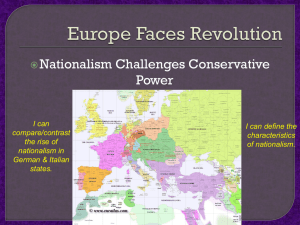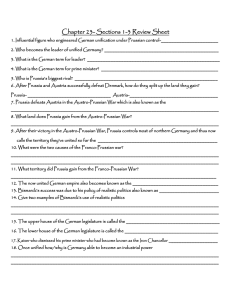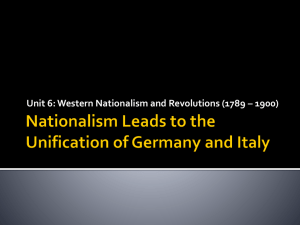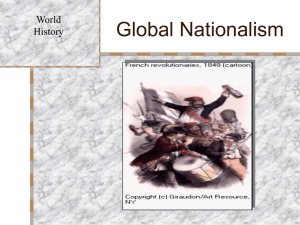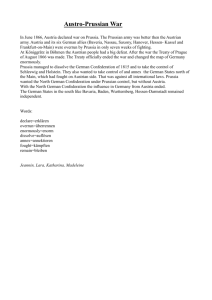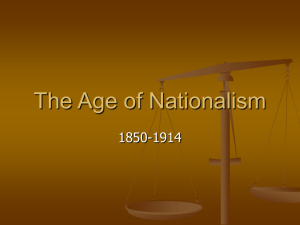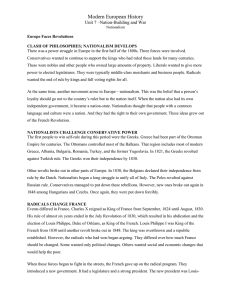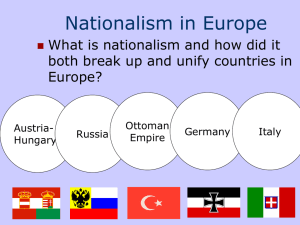German and Italian Unification
advertisement
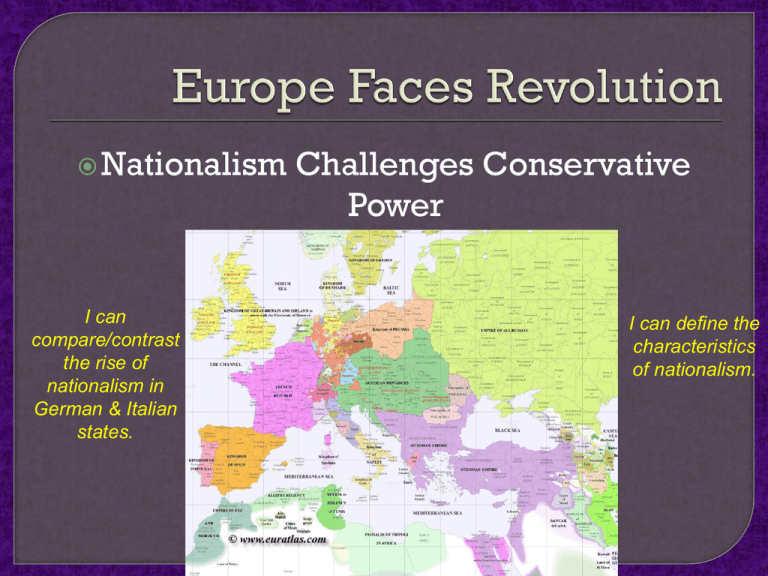
Nationalism I can compare/contrast the rise of nationalism in German & Italian states. Challenges Conservative Power I can define the characteristics of nationalism. 1st European country to win self-rule • Former part of Ottoman Empire (which was crumbling at this time, but not fully until 1922) Cause of Greek independence was popular throughout Europe Major powers such as Britain/Russia/France recognize an independent Greece in 1830. Congress of Vienna? There were ethnic uprisings in: • • • • • • France Prussia (Germany, Austria) Italy Greece Poland Hungary But revolutionaries failed to unite the nations, so they actually took a step backwards. 1800’s still under feudalism Russia still had not experienced a(n)… WRITE DOWN THE ANSWER!!! Due to old ways, Russia was falling behind other European countries Alexander II- freed serfs, 1861 Nationalism encouraged industrialism, and also ethnic groups wanting their own nations. Weakness leads to desperate measures. Austria- lost the Austro-Prussian war in 1866; split Austria and Hungary into independent states= Austrian-Hungary Empire (only 2 countries)- lost land Russia- Russification- forced culture on all ethnic groups Ottoman- Turks felt superior to other ethnic groups; genocide against Armenians 1894-1896; 1915 Strength or Weakness? 1830- King wants absolute power Revolt of people June Rebellion 1832 Louis-Philippe (more Liberal) king replaces old one (1830-1848) A Paris mob overthrows gov’t replaces it with a representative government- it falls apart Call for a president Louis-Napoleon III elected president- Nephew of Napoleon Bonaparte. • Four years later- becomes emperor • Good leader Camillo Sardinia Cavour – Prime minister of • Allied with Napoleon III, brought revolution and unity in N. Italy Giuseppe Garibaldi – unified S. Italy Cavour invaded Papal states, so S. voted to unite w/Cavour and N. Italy National unification of Italy, but still culturally, economically divided Pope’s Capital = Rome Power? Destiny of the weak is to be devoured by the strong. German Confederation – loose union of German states; Prussia – largest; Austria – head of confederation Otto von Bismarck- Prussia’s Prime Minister • Realpolitik – seek advantage for nation-state by any means, including war and breaking treaties • Wanted to go to war to unify Germany under Prussian rule • 7 Weeks War – Bismarck & Prussia against Austria. (Here they go again!) Treaty ending the war set up a (mostly) united Germany under Prussian control • Franco-Prussian War – Napoleon III declared war on Prussia. • Southern German states (not yet united w/the rest of Germany). They sided w/Prussia because disliked France. Defeated France and all German states now unified • Following Franco-Prussian War all German States unified. • Germany now an Empire w/Kaiser Wilhelm I as emperor Strengthened Tried Industry to crush opposition parties Bismarck’s policies left Germany strong, but w/o parliamentary democracy. When Wilhelm I died, his son succeeded him (Wilhelm II) and dismissed Bismarck (1890) Balance of Power- Undone • GOODBYE CONGRESS OF VIENNA • Britain, France, Austria, Prussia and Russia no longer equal • Britain and Germany = strongest • France = middle • Austria and Russia = weak 1. Which aging empires suffered from the forces of nationalism? 2. What advantages did Prussia have in leading the German states to unity? 3. How can nationalism be both a unifying and a disunifying force?
